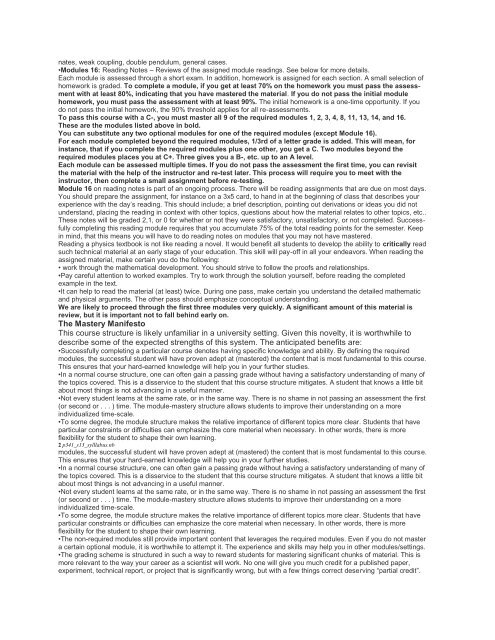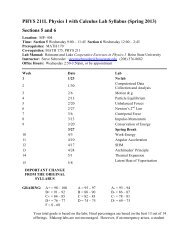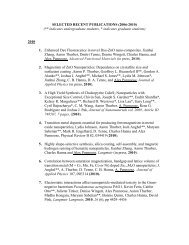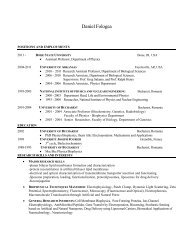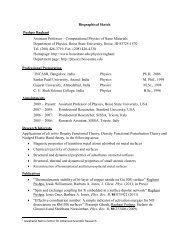Phys 341 - Mechanics - Spring 2013 - DEPARTMENT OF PHYSICS
Phys 341 - Mechanics - Spring 2013 - DEPARTMENT OF PHYSICS
Phys 341 - Mechanics - Spring 2013 - DEPARTMENT OF PHYSICS
Create successful ePaper yourself
Turn your PDF publications into a flip-book with our unique Google optimized e-Paper software.
nates, weak coupling, double pendulum, general cases.•Modules 16: Reading Notes – Reviews of the assigned module readings. See below for more details.Each module is assessed through a short exam. In addition, homework is assigned for each section. A small selection ofhomework is graded. To complete a module, if you get at least 70% on the homework you must pass the assessmentwith at least 80%, indicating that you have mastered the material. If you do not pass the initial modulehomework, you must pass the assessment with at least 90%. The initial homework is a one-time opportunity. If youdo not pass the initial homework, the 90% threshold applies for all re-assessments.To pass this course with a C-, you must master all 9 of the required modules 1, 2, 3, 4, 8, 11, 13, 14, and 16.These are the modules listed above in bold.You can substitute any two optional modules for one of the required modules (except Module 16).For each module completed beyond the required modules, 1/3rd of a letter grade is added. This will mean, forinstance, that if you complete the required modules plus one other, you get a C. Two modules beyond therequired modules places you at C+. Three gives you a B-, etc. up to an A level.Each module can be assessed multiple times. If you do not pass the assessment the first time, you can revisitthe material with the help of the instructor and re-test later. This process will require you to meet with theinstructor, then complete a small assignment before re-testing.Module 16 on reading notes is part of an ongoing process. There will be reading assignments that are due on most days.You should prepare the assignment, for instance on a 3x5 card, to hand in at the beginning of class that describes yourexperience with the day’s reading. This should include; a brief description, pointing out derivations or ideas you did notunderstand, placing the reading in context with other topics, questions about how the material relates to other topics, etc..These notes will be graded 2,1, or 0 for whether or not they were satisfactory, unsatisfactory, or not completed. Successfullycompleting this reading module requires that you accumulate 75% of the total reading points for the semester. Keepin mind, that this means you will have to do reading notes on modules that you may not have mastered.Reading a physics textbook is not like reading a novel. It would benefit all students to develop the ability to critically readsuch technical material at an early stage of your education. This skill will pay-off in all your endeavors. When reading theassigned material, make certain you do the following:• work through the mathematical development. You should strive to follow the proofs and relationships.•Pay careful attention to worked examples. Try to work through the solution yourself, before reading the completedexample in the text.•It can help to read the material (at least) twice. During one pass, make certain you understand the detailed mathematicand physical arguments. The other pass should emphasize conceptual understanding.We are likely to proceed through the first three modules very quickly. A significant amount of this material isreview, but it is important not to fall behind early on.The Mastery ManifestoThis course structure is likely unfamiliar in a university setting. Given this novelty, it is worthwhile todescribe some of the expected strengths of this system. The anticipated benefits are:•Successfully completing a particular course denotes having specific knowledge and ability. By defining the requiredmodules, the successful student will have proven adept at (mastered) the content that is most fundamental to this course.This ensures that your hard-earned knowledge will help you in your further studies.•In a normal course structure, one can often gain a passing grade without having a satisfactory understanding of many ofthe topics covered. This is a disservice to the student that this course structure mitigates. A student that knows a little bitabout most things is not advancing in a useful manner.•Not every student learns at the same rate, or in the same way. There is no shame in not passing an assessment the first(or second or . . . ) time. The module-mastery structure allows students to improve their understanding on a moreindividualized time-scale.•To some degree, the module structure makes the relative importance of different topics more clear. Students that haveparticular constraints or difficulties can emphasize the core material when necessary. In other words, there is moreflexibility for the student to shape their own learning.2 p<strong>341</strong>_s13_sylllabus.nbmodules, the successful student will have proven adept at (mastered) the content that is most fundamental to this course.This ensures that your hard-earned knowledge will help you in your further studies.•In a normal course structure, one can often gain a passing grade without having a satisfactory understanding of many ofthe topics covered. This is a disservice to the student that this course structure mitigates. A student that knows a little bitabout most things is not advancing in a useful manner.•Not every student learns at the same rate, or in the same way. There is no shame in not passing an assessment the first(or second or . . . ) time. The module-mastery structure allows students to improve their understanding on a moreindividualized time-scale.•To some degree, the module structure makes the relative importance of different topics more clear. Students that haveparticular constraints or difficulties can emphasize the core material when necessary. In other words, there is moreflexibility for the student to shape their own learning.•The non-required modules still provide important content that leverages the required modules. Even if you do not mastera certain optional module, it is worthwhile to attempt it. The experience and skills may help you in other modules/settings.•The grading scheme is structured in such a way to reward students for mastering significant chunks of material. This ismore relevant to the way your career as a scientist will work. No one will give you much credit for a published paper,experiment, technical report, or project that is significantly wrong, but with a few things correct deserving “partial credit”.


